
Romanesque architecture is an architectural style of medieval Europe that was predominant in the 11th and 12th centuries. The style eventually developed into the Gothic style with the shape of the arches providing a simple distinction: the Romanesque is characterized by semicircular arches, while the Gothic is marked by the pointed arches. The Romanesque emerged nearly simultaneously in multiple countries ; its examples can be found across the continent, making it the first pan-European architectural style since Imperial Roman architecture. Similarly to Gothic, the name of the style was transferred onto the contemporary Romanesque art.
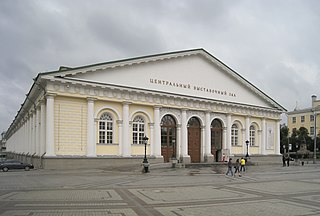
The Moscow Manege is an oblong building along the west side of Manege Square, which was cleared in the 1930s and lies adjacent to Red Square. It is the site of Moscow Design Museum since 2012.
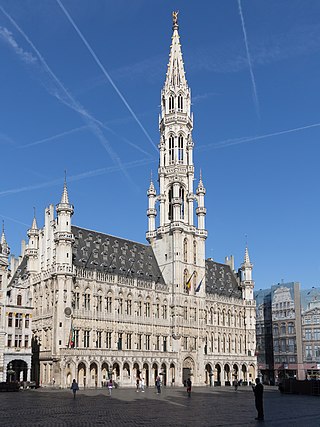
The Town Hall of the City of Brussels is a landmark building and the seat of that municipality of Brussels, Belgium. It is located on the south side of the Grand-Place/Grote Markt, opposite the neo-Gothic King's House or Bread House building, housing the Brussels City Museum.
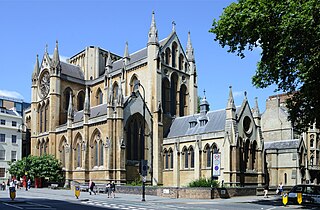
The Church of Christ the King belongs to Catholic Apostolic Church trustees; it is in Gordon Square, Bloomsbury, London. It adjoins Dr Williams's Library and is within sight of University College London. The church is used by the Anglican mission Euston Church for Sunday services and its English Chapel, at its east end, by Forward in Faith for weekday services. It has been a Grade I listed building since 10 June 1954, one of 129 such Christian buildings in London.

French architecture consists of architectural styles that either originated in France or elsewhere and were developed within the territories of France.
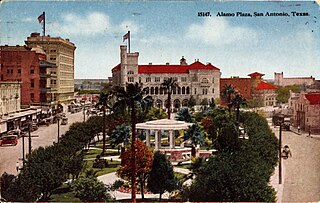
The Alamo Plaza Historic District is an historic district of downtown San Antonio in the U.S. state of Texas. It was listed on the National Register of Historic Places in 1977. It includes the Alamo, which is a separately listed Registered Historic Place and a U.S. National Historic Landmark.

The Cass Park Historic District is a historic district in Midtown Detroit, Michigan, consisting of 25 buildings along the streets of Temple, Ledyard, and 2nd, surrounding Cass Park. It was listed on the National Register of Historic Places in 2005 and designated a city of Detroit historic district in 2016.

Corder House and Sydenham House are two, adjacent, Grade II listed buildings on Fawcett Street, in Sunderland, Tyne and Wear, England. Designed by Frank Caws in the Neo-Moorish style, they were constructed in brick from 1889–1891 by David and John Rankin with terracotta features by J. C. Edwards of Ruabon.
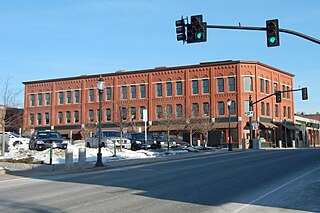
The Masonic Block is an historic commercial block in Reading, Massachusetts. This three-story brick building is distinctive in the town for its Renaissance Revival styling. It was built in 1894 by the local Reading Masonic Temple Corporation, and housed the local Masonic lodge on the third floor. The building was listed on the National Register of Historic Places in 1984.
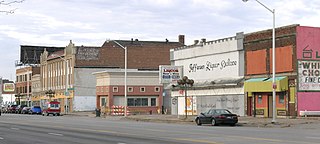
The Jefferson–Chalmers Historic Business District is a neighborhood located on East Jefferson Avenue between Eastlawn Street and Alter Road in Detroit, Michigan. The district is the only continuously intact commercial district remaining along East Jefferson Avenue, and was listed on the National Register of Historic Places in 2004.

Williston Congregational Church is a historic church in the center of Williston Village on United States Route 2 in Williston, Vermont. Built in 1832 and the interior restyled in 1860, this brick church is a fine local example of Gothic Revival architecture. It was listed on the National Register of Historic Places in 1973.

St. George's Catholic Church is a historic church and school building on Vermont Route 25 in Bakersfield, Vermont. Built in 1840, it housed the South Academy until 1888, when it was purchased by the Roman Catholic Diocese of Burlington. It served as a church until 1996, and has since then housed the local historical society. It is a prominent local example of Gothic Revival architecture, and was listed on the National Register of Historic Places in 2001.

The Clinton Downtown Historic District is a historic district located in the village of Clinton in Clinton Township in the northernmost portion of Lenawee County, Michigan. It consists of most of the 100 block of U.S. Route 12, known locally as West Michigan Avenue, plus Memorial Park at 200 West Michigan. The district was added to the National Register of Historic Places on April 27, 2010.
St. John Chrysostom's Church is a Roman Catholic parish church under the authority of the Roman Catholic Archdiocese of New York, in the Morrisania section of the New York City borough of the Bronx.

The Jonesborough Historic District is a historic district in Jonesborough, Tennessee, that was listed on the National Register of Historic Places as Jonesboro Historic District in 1969.

St. Michael's Church in Jircháře, Prague - New Town near the National Theatre, specifically the New Town street, which is called v Jirchářích. It is the seat of Czech, Slovak and English congregation of the Evangelical Church of the Augsburg Confession in the Czech Republic. Its architectural style is not uniform due to alterations in different periods and styles. It is protected as a cultural monument of the Czech Republic.

The Lee Tracy House is a historic house on United States Route 7 in the village center of Shelburne, Vermont. Built in 1875, it is one of a small number of brick houses built in the town in the late 19th century, and is architecturally a distinctive vernacular blend of Gothic and Italianate styles. It was listed on the National Register of Historic Places in 1983.

Main Building is the central administration building of St. Edward's University in Austin, Texas, and formerly also of St. Edward's High School. First completed in 1888 and rebuilt after a fire in 1903, Main Building has been listed on the National Register of Historic Places since 1973, along with adjacent Holy Cross Hall.

The University of Michigan Central Campus Historic District is a historic district consisting of a group of major buildings on the campus of the University of Michigan in Ann Arbor, Michigan. It was listed on the National Register of Historic Places in 1978.


















